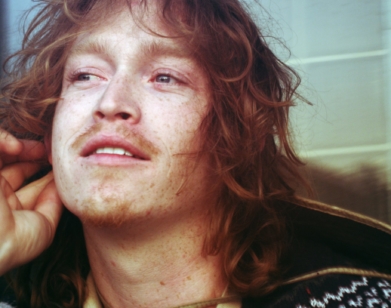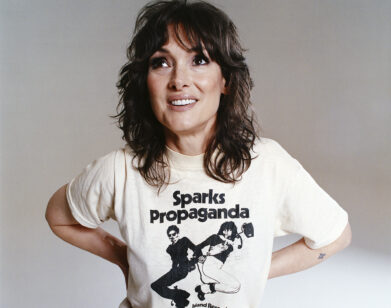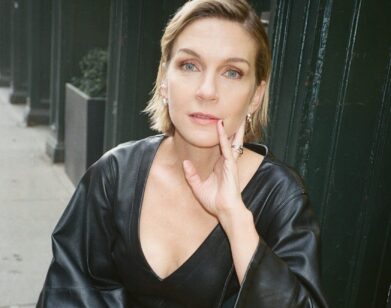How Caleb Landry Jones became Hollyweird’s best supporting actor
It’s hard out here for Caleb Landry Jones. The guy seemingly can’t make it to the end credits in any film in which he appears. Get Out? Grotesquely stabbed by candelabra. Three Billboards Outside Ebbing, Missouri? Decked by Sam Rockwell and thrown out a two-story window. Twin Peaks? Death by suicide. “I get brutally killed in most things I’m a part of!” says the actor, laughing down the phone from his parents’ farm in rural Texas.
Outside of motion pictures, the real Jones often worries his time might mysteriously expire, holding up a dirty mirror to the offbeat characters he plays. “I’m always talking to the little voice inside that says, ‘You only got a year left!’ ‘Caleb, two years Caleb!’ or ‘Okay, four years … that’s when I’m pulling the plug!’”
Barely 28 (his birthday is today), there is exactly zero chance his burgeoning career will plateau. He has appeared in several hot awards contenders this year alone—Three Billboards, Get Out, and The Florida Project among them—and demand for his freckled Texas mug and intensely delivered stares are at an all-time high. So, in the words of Barbara Walters, how did he get to be this?
TREY TAYLOR: Hey, what’s going on?
JONES: I’m at my parents’ place in Texas. I have to go look at the pigs. We’re trying to make sure the pigs are up and out because they’ve been asleep all morning.
TAYLOR: Did you grow up on a farm?
JONES: No, I grew up in Richardson, Texas, which is a suburb in Dallas. So I grew up where everything was walkable—you could walk to the fire department, you could walk to the store, you could walk to go get ice cream—that kind of thing. You had to drive to get to the library.
TAYLOR: Did you spend a lot of your time at the library?
JONES: I don’t know if I’d say a lot but I would go to the library quite a bit. My mother and my brother and I would go twice a week usually and we would check out some of the VHS’s. Sometimes they had some comic books that were good. Usually it was the VHS’s of The Hardy Boys and Narnia and stuff like that. You would get some strange television that you haven’t heard of but that was popular in America in the ‘70s, you know? [laughs] They had the Tom Jones collection, the mini-series on VHS and I’m sure they had four copies of Titanic and stuff like that.
TAYLOR: I worked in a library once and I remember I would always watch Buffy the Vampire Slayer whenever it was on TV—
JONES: Oh shit! Sorry, my sheep just got in the barn. What were you saying?
TAYLOR: That I used to watch Buffy the Vampire Slayer on TV when it was on but I was so young that I don’t really remember. But then I started to work at a library and they had all of these old tapes and I would watch them again and I was like, “Dang, this show is actually so good.”
JONES: My theater teacher in high school was obsessed with Buffy the Vampire Slayer. He said it was a brilliant show and the writing was incredible and, “Very few people understand the genius behind this show.” I never saw it but he loved it!
TAYLOR: Even with that rave review you never watched it?
JONES: [laughs] No and I should! He put me on to a lot of good stuff.
TAYLOR: What did he teach you?
JONES: He taught me all the textbook stuff about what a play is and what a drama is and what a tragedy is… And then he showed me—well, I’d already seen Citizen Kane [1941], but he was showing it to the class and he was like “He knows!” He showed me [Ingmar Bergman’s] The Seventh Seal [1957], which I had never seen before, which really, really, had an affect on me. And he showed me Double Indemnity [1944], which I’d never seen before and I wasn’t into film that much before then. I was turned on to a lot of great stuff.
TAYLOR: Were you in the theater productions at school or no?
JONES: I was in all the things that our class did, but I wasn’t in any of the big ones.
TAYLOR: Were you too cool?
JONES: No, I just didn’t get the parts.
TAYLOR: When you go back to Texas, you must get people that are like, “You’re so famous, I’ve seen you in the movies!” How does that feel?
JONES: Well last year, because last year was more work than I’ve ever had in a year ever, there was a lot of stuff that came out around the same time. So there had been more of that than I’ve experienced before … I guess it’s kind of weird in the scheme of things, when you think about it.
TAYLOR: I’m curious to know if you’ve heard of the CLJ Army, the superfan Twitter account that tracks your career.
JONES: Yeah! [laughs] I’m glad that someone’s paying attention. I’m really glad that someone’s paying attention.
TAYLOR: What do you imagine a young audience would find appealing about you?
JONES: I guess that I’m as lost as they are. [laughs] I’m on the same road of figuring it out as anyone else.
TAYLOR: Did you consciously set out to be a great actor?
JONES: I went out to L.A. to definitely make that a reality, rather than just feeling a hunch that I have. But I knew somehow it would work, I knew that I had something. I don’t know how to say it, but I knew just from watching movies that I love so much or actors that I love so much, that I was able to get to a similar place. But I didn’t know what kind of work I’d get, I hadn’t really thought of any of that. But I knew I’d be a part of it in some way. I felt I had something up my sleeve that not everyone had for some reason.
TAYLOR: There’s this old interview with Oprah and Barbara Walters asks, “How did you get to be this?” and Oprah responds, “Somewhere I’ve always known I was born for greatness in my life.”
JONES: But what is greatness though? Is that greatness? Is having your own show and saying your own name and waiting for applause, that one second goes by, everybody claps, but you waited for your own fucking applause—is that greatness?
TAYLOR: Are you not an Oprah fan?
JONES: I love Oprah, but I was watching her show—I don’t know if it was the ’80s or ’90s or when it was—but she comes down the walkway and, I got nothing against Oprah, but she says her name, she says the show, her name, and then she waits for a second after that for everyone to clap. [laughs] And I thought, “Oh no.” Because now she doesn’t have to do that. But at one point she was waiting and giving it to them like, “Okay, you motherfuckers clap. You clap.” I get the biggest kick out of it. [laughs]
TAYLOR: Isn’t there something about being your own PR person until people actually know about your talent or pay attention to you? Like a “fake it till you make it” kind of thing?
JONES: No, I feel like it shouldn’t work like that. If you’re a good fighter on the street, you don’t have to tell anybody that you’re good at fighting. Let someone else talk about how great you are at this or that or whatever is the case. And if no one finds out then no one finds out, that’s fine too. But I think leading by example is always the strongest.
TAYLOR: Have you ever looked back on a role and regretted anything?
JONES: There’s always mixed feelings about the work that I do. When you’re playing a real person, that’s another kind of responsibility. I have to say that every time that I have played a real person, even though I gave it everything I could, I feel like I misinterpreted trying to represent them. All the time I feel like I screwed it up! [laughs] But I don’t know if that’s because I can’t separate myself from it enough, you know?
TAYLOR: Speaking of playing real-life characters, you played Ilya in the Safdie Bros’ Heaven Knows What, who was a real guy. I read that you watched him overdose in a McDonald’s once—was that scary?
JONES: Yeah, that was the first day I met him. That was the whole fucking movie in a nutshell. I got to see him in full extremes—from one extreme to another extreme. In the amount of several hours, I got to see him go from one spot, to the whole other side of the spectrum in a few hours. We were pretty inseparable, so it didn’t end that night. [laughs] I think we went back to the hotel [I was staying at]. It was a very nice hotel, so we went back there and after drinking that mini bar, we slept in the bed and had probably the only great night of sleep for that whole shoot. [laughs] That was like the only one! And I’ve got Ilya in the bed snoring and we all still had our boots on. Great, great memories. That was a horrible day but it was also such a fucking wonderful day.
TAYLOR: I heard he passed away.
JONES: Yeah, he did.
TAYLOR: You’ve been called Hollywood’s Go-To Oddball. What do you make of that?
JONES: That’s great. Sure! I don’t know what to think about that, I hadn’t thought about that till you said that just now.
TAYLOR: Do you think you’re an outsider?
JONES: I’ve never thought of myself as an outsider but the more I’m around people, it appears to be that I’m an outsider. When they look at you and go, “What planet did you drop in from?” I don’t know, but it’s always been like that.
TAYLOR: I want to know what happened with your involvement in Jonas Åkerlund’s Lords of Chaos?
JONES: Yeah we spoke, he wanted me to play a character and so I said okay, and then a year later we met again because we still hadn’t got the finances to do it yet. By the time they were actually filming and had financing together, I had already said yes to something else. I had to be a part of these other projects.
TAYLOR: Do you regret not having the time to do everything that you want to do?
JONES: No. There’s a few interviews with Johnny Depp and Depp says he was at his house having dinner with [Marlon] Brando and Brando asks him how many movies he does a year. Depp says, “Three or four,” and Brando says, “That’s too much.” And Depp says, “Why?” Brando says, “An actor only has so many faces in his pocket!” That idea of spreading yourself thin … I also never thought I’d live this long, so I’ve also jumped at any opportunity, anything that slapped me across the face that made me cry. I’ve done my best to be a part of it.
TAYLOR: You didn’t think you’d live this long?
JONES: I don’t know man. I kept thinking it would be this age or that age or maybe that age, then I tried to cut that little voice out that keeps going, “Okay boy, you only got one year left!”
TAYLOR: You get brutally killed in Get Out—
JONES: I get brutally killed in most things I’m a part of! [laughs]
TAYLOR: Sam Rockwell beats you up in Three Billboards and in Twin Peaks you shoot yourself. What is the deal?
JONES: I don’t know, [there is] something about me where people just want to beat the shit out of me or blow me up. There’s a great little bit with Spike Milligan, who was in The Telegoons with Peter Sellers back in the Korean war. It was a radio show. Thanks to YouTube you are able to see it, but he has this bit, and he comes out and he’s probably in his early 80s. He comes out and has a dummy with him. So he has him dressed in a suit and he’s sitting in a chair and he looks at the dummy and he points at the dummy and says, “This is for every time someone doesn’t laugh at a joke! I take it out on him!” He gives him a punch, and nobody laughs so he punches him again. So throughout the performance every now and again he’ll take out the dummy and give it a punch. I can’t help but think that maybe I’m the dummy sometimes.
TAYLOR: It’s great to be the dummy now.
JONES: I’m honored! I’m honored to be blown up, set on fire, shot, suicide, I’m honored to go anyway I’m going!
THREE BILLBOARDS OUTSIDE EBBING, MISSOURI IS OUT IN THEATERS NOW.







